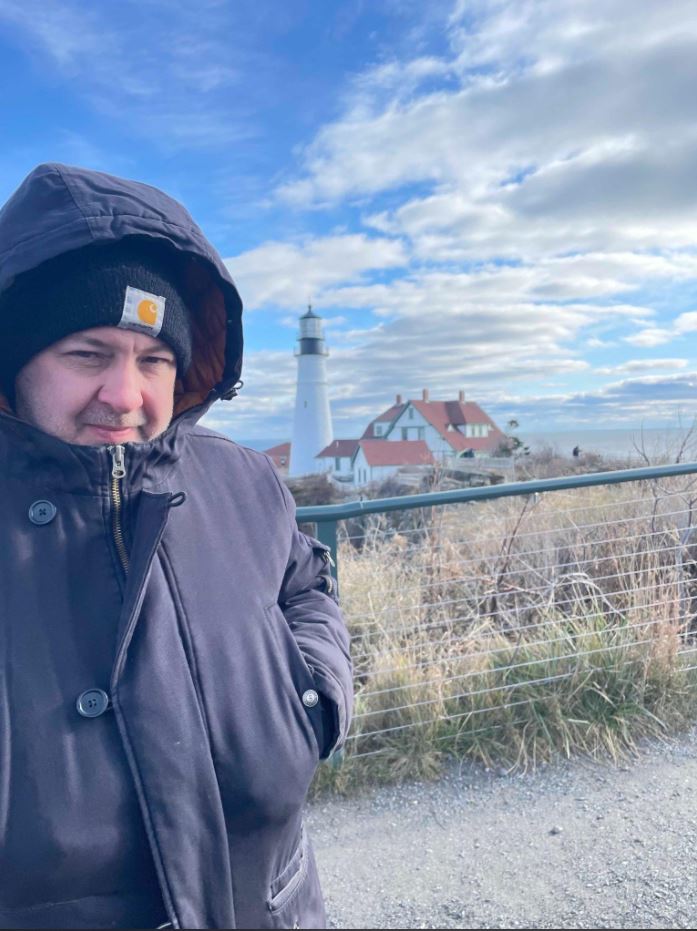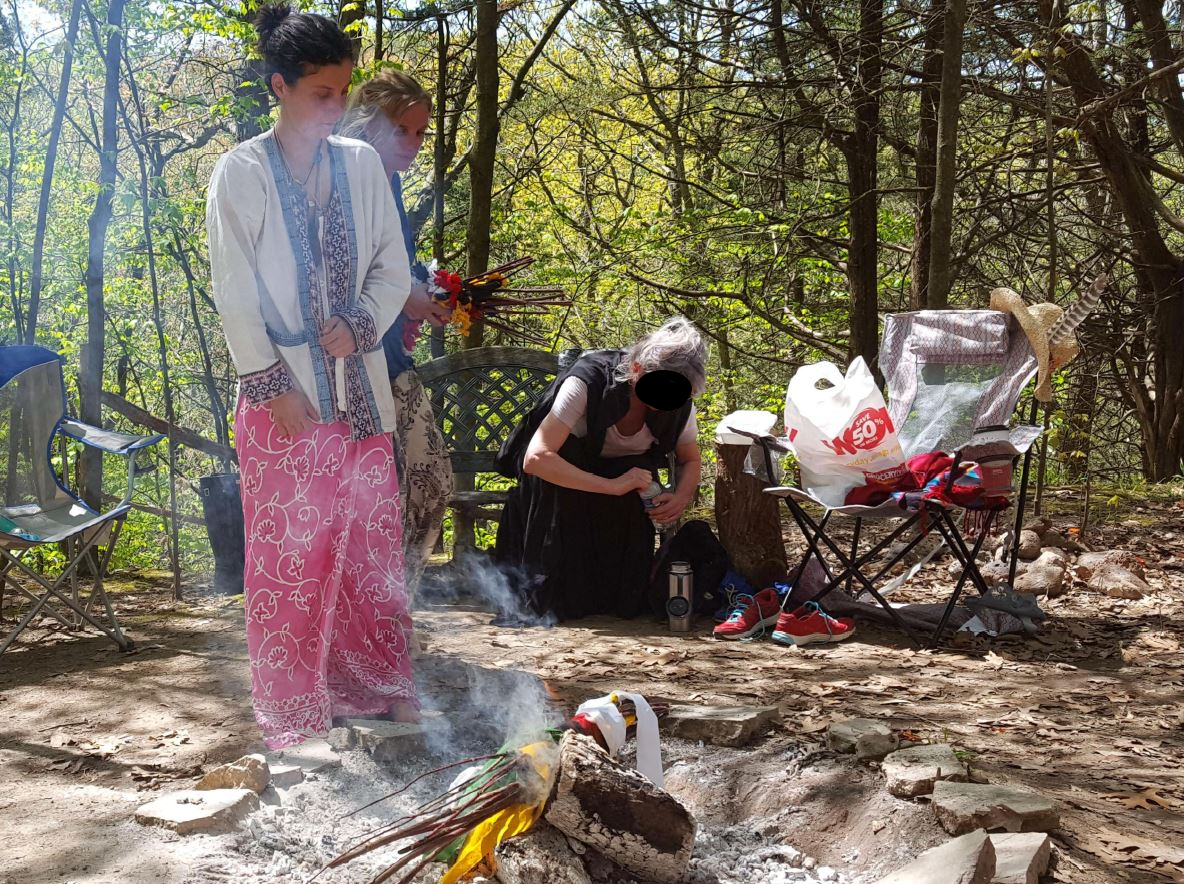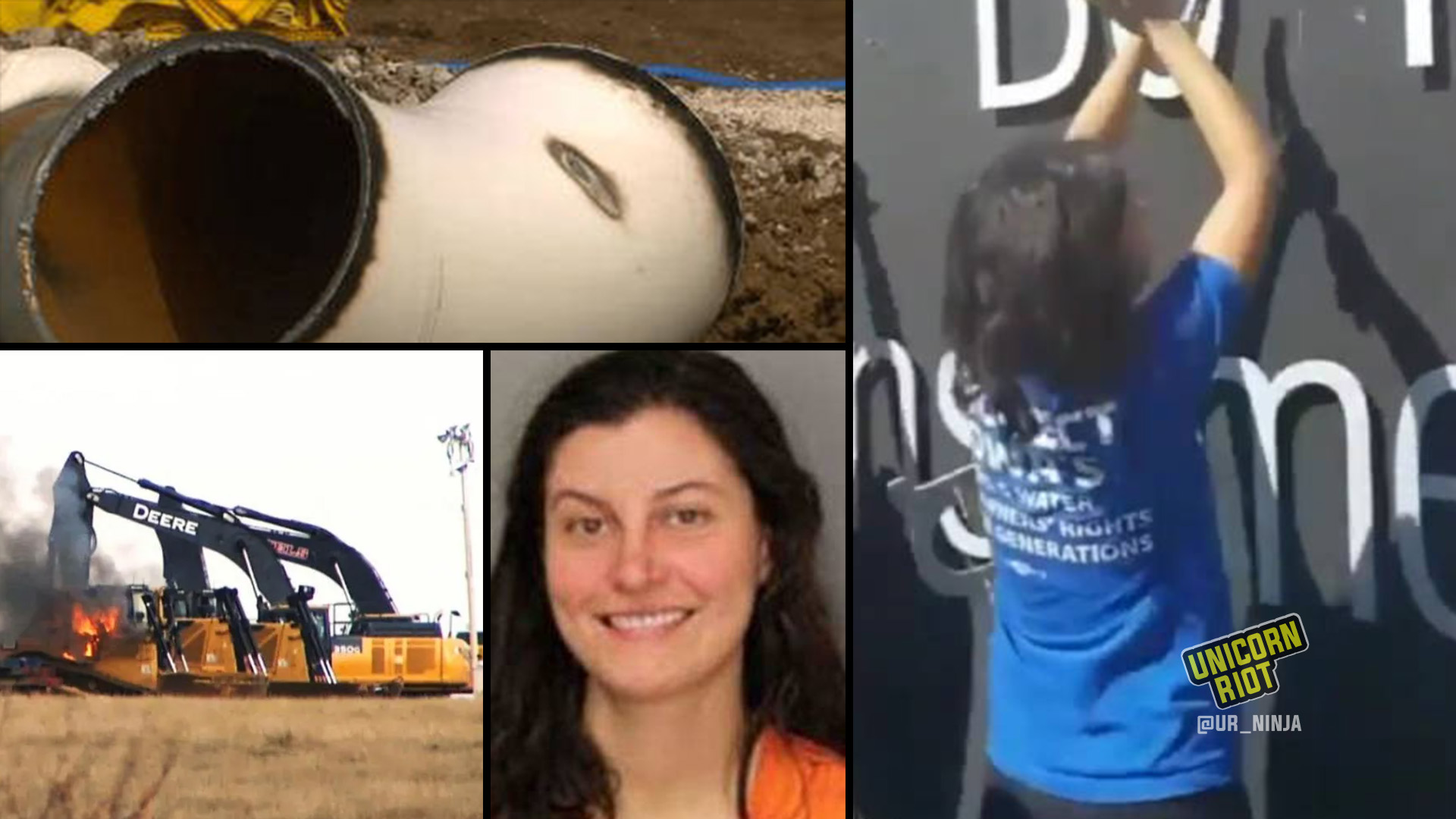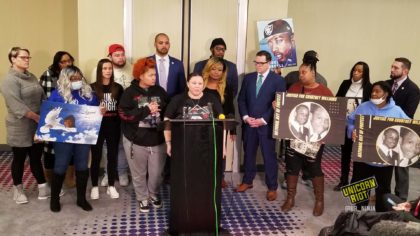Ruby Montoya Case Raises Questions about Cooperation and Movement Lawyering
Ruby Montoya is doing whatever she can to lighten her punishment after publicly admitting to a string of arson and sabotage attacks against the Dakota Access Pipeline (DAPL) in 2017.
According to a recent article in The Economist, “Montoya agreed to cooperate with the FBI” in fall 2020. During such FBI debriefs, agents typically attempt to solicit information on other activists and pressure co-defendants to testify against each other. (The Economist declined to reveal its source for this information, and in an email to Unicorn Riot, Montoya denied cooperating with the FBI).
Since summer 2021, Montoya’s lawyer has repeatedly filed motions on her behalf asking the court to allow her to file documents under seal—a practice typically avoided by those facing political charges in an effort to be transparent about engagement with law enforcement and the courts. In a motion in federal court in August, Montoya claimed she was coerced into taking action by her co-defendant Jessica Reznicek, members of the Des Moines Catholic Worker Community and others, and that she felt forced into pleading guilty to the charges against her by her former attorney.
On June 30, Reznicek was sentenced to 8 years in prison after accepting a non-cooperating plea deal.

As Montoya scrambles to cast blame on others, the climate movement around her faces fundamental questions about cooperation with law enforcement and movement lawyering. Movement lawyering is a term for legal defense strategies that consider the needs of and take direction from broader political movements in its defense of individual activists.
Although there is no solid proof publicly available yet that Montoya is selling out her former comrades to the FBI, some in the movement think that the evidence is pretty clear.
“It’s quacking and it has a beak so I’m thinking it’s a duck,” said Daniel McGowan, a former political prisoner who served 7 years in prison for eco-sabotage after refusing to cooperate with the government against his co-defendants during the Green Scare. McGowan now works as a paralegal and pays close attention to cases in which activists are charged with crimes similar to those he pleaded guilty to.

McGowan believes the sealed documents in Montoya’s case demonstrate a lack of transparency.
“It’s problematic because with other evidence that we’ve seen like The Economist article that was just published and things said in court and things said to the media, I think it’s pretty apparent that Ruby Montoya is cooperating against Jessica and others and that her lawyer is facilitating that at this point.”
Daniel McGowan, paralegal and former political prisoner
Montoya’s current attorney, Daphne Silverman, refused to comment on whether Montoya is or has been cooperating with law enforcement. “As a lawyer representing Ruby Montoya,” Silverman said, “I owe Ms. Montoya a duty to represent her interests alone, which requires me to place those interests paramount and not be held back by any conflicts of interest, including the interests of a movement or another individual.”
In McGowan’s case, several of his former friends chose to provide information on him and others in hopes of receiving lighter sentences. “I remember reviewing a plea bargain of my co-defendant and I had to review it in the presence of my lawyer because there was concern about leaks,” McGowan said. “So I remember asking ‘what part is sealed?’ And my lawyer showed me the three sections and it was, of course, the sections about cooperation.”
In addition to filing sealed motions with the court, Silverman struck a blow against movement lawyering in August when she filed a motion seeking to withdraw Montoya’s guilty plea and accusing Montoya’s former attorney, Lauren Regan, of a conflict of interest stemming from her commitment to concepts like “solidarity.”
Now, a group within the National Lawyers Guild is pushing back. In an internal statement (PDF) obtained by Unicorn Riot, the National Lawyers Guild Federal Repression Taskforce condemned Silverman, who is a Guild member, for her attacks on movement lawyering and called for her expulsion from the Guild. According to the statement, the Taskforce “was formed by experienced lawyers and legal workers in the summer of 2020 to track and help respond to instances of federal law enforcement questioning, harassment, grand jury subpoenas, and other repression against social movements.”
“We wrote this statement to respond to Daphne’s attacks on movement lawyering,” the group wrote, “and to assert that Daphne should resign from Guild membership because her professed values do not align with the Guild in crucial respects. If Daphne does not resign, we believe the Guild has a responsibility to expel her from Guild membership.”
In the motion, Silverman claimed that rather than approach the case with her client’s best interest in mind, Regan had coerced Montoya into accepting the plea for political reasons. “Ms. Montoya was coerced by attorney Lauren Regan,” the motion read, “to accept a packaged plea deal in ‘solidarity’ with her ‘comrade’ in the ‘movement’, co-defendant Jessica Rae Reznicek.”
Lauren Regan and the Civil Liberties Defense Center declined to comment for this article.
The Federal Repression Taskforce statement criticized Silverman for treating concepts like “solidarity” as suspect.
“Regardless of her intent, the motion implies that solidarity with co-defendants and concern for the impact to social movements are not legitimate client concerns. To the contrary, many activist-clients choose to center goals that extend beyond the direct legal outcome of their cases.”
National Lawyers Guild Federal Repression Taskforce statement
The National Office of the National Lawyers Guild declined to comment on the Taskforce statement and on Silverman’s criticisms, citing the sensitivity of the case due to its “wide-reaching impact and potential repercussions for protest law and Indigenous peoples’ rights.”
“It is outrageous that the concept of solidarity is being touted as bullying or manipulation when one is fighting for their life in the courts of the most powerful carceral system in the world. A system which is standing up for one of the wealthiest and most exploitative corporations in the world,” said Garrett Fitzgerald, an activist legal worker in Minneapolis with over a decade of experience helping activists defend themselves against repression.
“Ruby has broken her solidarity with the movements for change she claimed to support. More painfully, she has broken solidarity with and betrayed Jessica. I can’t imagine the hurt and heartbreak Jessica must be feeling.”
Garrett Fitzgerald, activist legal worker
The Taskforce statement raises concerns about the potential broad impact of Silverman’s attacks on movement lawyering. “Daphne’s argument suggests that anyone holding a leadership position in—and possibly anyone who is a member of, employed by, or affiliated with—any of these or similar organizations has a conflict of interest any time they represent an individual activist,” the statement reads. “This, quite plainly, has potential to bolster prosecution arguments to deny activists their chosen counsel. If the argument were to gain traction, it would undermine competent movement legal defense.”
“The vision Daphne articulates is one in which activist legal representation is wholly separate from the movement, a cadre of potentially sympathetic but ultimately outside experts to call upon in times of need. Ultimately this serves the mystification and inaccessibility of the law and legal assistance, upholding a status quo in which legal technicians hold power over the communities and movements they profess to support.”
National Lawyers Guild Federal Repression Taskforce statement
For McGowan, the Taskforce statement doesn’t go far enough. The statement, McGowan said, “wants to defend a concept, the practice, of movement lawyering, but not defend a person that has been thrown under the bus, an actual NLG member, Lauren Regan.”
“The idea that Lauren Regan is some bully that pushes people to take plea bargains, and did this with Ruby is laughable. What’s worse is the silence regarding all of this. I don’t understand how the NLG [Taskforce] can write this theoretical statement, defending movement lawyering, but not defending the actual people that engage in movement lawyering.”
Daniel McGowan, paralegal and former political prisoner
The NLG’s Federal Repression Taskforce declined to comment for this article, but did confirm that the statement was produced by their group.
In response to the Taskforce statement, Silverman filed another motion in federal court last week claiming that Regan is behind the efforts to expel her from the Guild. “Tellingly, since the filing of the motion to withdraw, Ms. Regan has sought to have undersigned counsel expelled from the National Lawyers Guild (NLG) for prioritizing Ms. Montoya’s interests above the movement,” the motion reads. “A faction of the Guild at the behest of Ms. Regan has taken the position that a lawyer can prioritize a movement and require a client to act in the best interest of the movement including pleading guilty and going to prison instead of investigating defenses and proceeding to trial.”

McGowan takes particular umbrage with Montoya’s efforts to blame Reznicek for the pipeline sabotage they both admittedly took part in. “It just comes across as blaming everyone but Ruby for things she did,” said McGowan. “And I don’t want to see anyone go to prison. I certainly don’t want to see Jessica in prison, but I wonder why is Ruby special? Why is Ruby special when Jessica is sitting in a bunk bed in a room of a hundred women at Waseca, basically on lockdown status, because the prison is on a COVID restriction?”
In a recent conversation with The Economist, Reznicek spoke from FCI-Waseca, a Federal women’s prison in Minnesota, saying that Montoya’s recent claims made her “so angry.”
“I did not do what she’s saying, not anything like that. Our journeys were so intertwined. Despite what she wants to claim, she was very much a part of it.”
Jessica Reznicek, co-defendant of Ruby Montoya
“If Ruby Montoya and Jessica did these actions together,” said McGowan, “and went on a tour doing public events talking about what they did and were fully responsible, accountable adults, then why now, when the shit hit the fan, is one of the people seeking to just get out of it? To be honest, that’s how I see all these pleadings.”
The recent allegations of Montoya’s lack of transparency and the allegations of cooperation with the FBI has caused some within the movement to question whether they should continue to support her. In September, Chase Iron Eyes with the Lakota People’s Law Project released a video in collaboration with Montoya seeking to build support for her case.
“This is a critical moment for the Indigenous and environmental justice movements,” said Iron Eyes in an email to Unicorn Riot. “Our communities live on the frontlines of the climate battle, and we strongly believe that no water protector should ever be prosecuted for standing up for Mother Earth — much less convicted as a terrorist. We absolutely cannot allow that to become the status quo. It breaks my heart to see that this happened to Jessica, and it’s why we initially supported Ruby when she asked for our help.”
“At this stage, we have no direct knowledge of cooperation by Ruby with law enforcement. If those rumors are true, that’s indefensible and precludes us from offering any further assistance. It’s important that we, as justice advocates, show solidarity with one another at all times — especially when those with access to the levers of power seek to divide us.”
Chase Iron Eyes, Lakota People’s Law Project
Montoya also maintains a GoFundMe page to raise money for Silverman’s legal representation. The campaign lists a target fundraising goal of $176,000. According to documents recently filed by Silverman in federal court, Regan and her organization, the Civil Liberties Defense Center, had previously been representing Montoya pro-bono.
McGowan says he thinks this continued support sends a confusing message to activists about how one should behave when confronted with state repression.
“There’s a GoFundMe that is out there trying to raise money for the lawyer. And apparently there’s water protector organizations that give money to this cause. And I don’t understand it at all. I think it gives a very bad message to the movement, that at the end of the day we’re going to support people who betray their co-defendants. It’s not principled and it’s not clear, and it’s very confusing.”
Daniel McGowan, paralegal and former political prisoner
Silverman’s recent filings draw on the government’s evidence against Montoya in the DAPL sabotage case, which reportedly contain 265 reports from the private security firm TigerSwan, including numerous reports from law enforcement.
Silverman continues to allege that Montoya and Reznicek were taught to weld by undercover operatives who sought to entrap them. “TigerSwan documented Ms. Montoya’s heartfelt commitment to protecting the climate for our children,” Silverman wrote in the pleading, “documented their connection to law enforcement and documented their immediate knowledge of who caused the damage to the pipes. The only way this knowledge is possible is through a provocateur informant who was present for the training.”
“Montoya is a young female who appears to have been brainwashed,” a TigerSwan operative wrote during the investigation, according to the pleading.
TigerSwan’s involvement in the Standing Rock protests, and their investigation into Montoya and Reznicek, has been widely reported. In response to the historic protests against the Dakota Access Pipeline, TigerSwan was contracted by Energy Transfer Partners to provide additional private security to the pipeline company in the face of mounting and increasingly militant public pressure. In 2017, The Intercept obtained about 1,100 TigerSwan reports from public records requests and a leak from a private contractor, documenting the company’s surveillance of anti-pipeline activists.
(Unicorn Riot interviewed Alleen Brown, one of the authors of The Intercept article, to discuss the TigerSwan documents.)
TigerSwan was the first to identify Montoya and Reznicek as the likely perpetrators of a series of arson and sabotage attacks on the pipeline. In a May 2017 report obtained by the Intercept, TigerSwan agents wrote, “The best assessment based on the known facts is that the attack was most likely conducted by Iowa activists; Jessica Reznicek and Ruby Montoya.”
Over four years later, as Montoya continues to deny responsibility for the actions she took, a fragmented climate justice movement seeks to define its values. In the crucible of state repression, where concepts like “movement lawyering” and “solidarity” can define futures, the Montoya case may now be laying the groundwork for what’s to come.
“Obviously, the scramble to get the shortest sentence results in the government winning and individual defendants and the movement losing,” said McGowan. “I think that when people stay together and are strong and work with each other by sharing information and sharing legal resources, we come out a lot better.”
Cover image composed by Alex Binder of Unicorn Riot.
Unicorn Riot's Coverage of DAPL Saboteurs Jessica and Ruby:
- Two Women Claim Responsibility for Sabotage and Arson Attacks to Stop DAPL - July 24, 2017
- DAPL Saboteur Jessica Reznicek Sentenced to 8 Years - July 14, 2021
- Ruby Montoya Seeks to Withdraw Guilty Plea, Citing Coercion, Entrapment and Mental Health - September 3, 2021
- Ruby Montoya Case Raises Questions about Cooperation and Movement Lawyering - December 2, 2021
- Prosecutor Seeks 8 Years in Prison and Terrorism Enhancement for DAPL Saboteur Ruby Montoya - July 26, 2022
- DAPL Saboteur Ruby Montoya Sentenced to 6 Years in Federal Prison - September 26, 2022
Follow us on X (aka Twitter), Facebook, YouTube, Vimeo, Instagram, Mastodon, Threads, BlueSky and Patreon.
Please consider a tax-deductible donation to help sustain our horizontally-organized, non-profit media organization:

Below is Unicorn Riot's coverage of the #NoDAPL anti-Dakota Access Pipeline struggle from early summer 2016 to present:
Watch our feature-length documentary, Black Snake Killaz: A #NoDAPL Story
March - May 2016- March 29th, “Tribal Citizens Prepare to Blockade Bakken Oil Pipeline“.
- April 3rd, “Tribal Citizens Build Camp in Path of Oil Pipeline“.
- May 5th, “Sacred Stone Camp Resists Dakota Access Pipeline“.
- May 27th, “Dakota Access Pipeline Blockade Enters 2nd Month“.
- After covering the camp in the spring of 2016, Unicorn Riot returned to Standing Rock Reservation on Wednesday, August 10th, when Standing Rock tribal members and allies blocked the entrance to the Dakota Access Pipeline construction site.
- On Thursday, August 11th, a dozen or so people were arrested blocking the construction site entrances.
- Day 3, Friday, the fight to protect land & water intensified around the construction sites of the Dakota Access Pipeline.
- On the 4th day, the pipeline resistance encampment swelled and prepared for more action.
- Monday, August 15th, land defenders stormed the construction site halting construction, and the next day construction was halted as well.
- August 17th saw State Police begin checkpoints, roadblocks, and psyops as protesters united to defend water.
- August 24th, camps prepared as Federal injunction hearing looms.
- Camps Organize to Stay as Injunction Postponed.
- On August 31st, Non-Violent Direct Action Stopped DAPL Construction for Over 6 Hours.
- September 6, indigenous water protectors swarmed Dakota Access Pipeline site, stopped work
- September 7, Uŋpa Nuŋpa was interviewed about ongoing #noDAPL actions
- North Dakota highway patrol refused to release email correspondence with Energy Transfer Partners
- September 8, ND National Guard took over Dakota Access Pipeline checkpoints
- Friday, September 9, US Govt. overruled federal judge and requested pipeline construction halted at Lake Oahe
- Meanwhile, cultural activities continued at #NoDAPL camps despite more arrests/warrants
- September 13, 20 were arrested during #NoDAPL lockdown, including 2 Unicorn Riot journalists
- September 14, direct actions continued against Dakota Access Pipeline while legal repression intensified
- On September 16 a federal judge dissolved the unconstitutional temporary restraining order Dakota Access, LLC had filed against Stranding Rock tribal members
- September 19, as solidarity protests spread nationwide, the federal appeals court ordered construction temporarily stop on Dakota Access segment as Solidarity Protests Spread Nationwide
- September 21, #NoDAPL noise demo demanded freedom for jailed water protector Olowan Martinez
- September 22, water protectors disrupted the annual meeting of the North Dakota Petroleum Council
- September 25, water protectors planted trees on DAPL construction site
- In Iowa on September 26, a non-violent direct action from the Mississippi Stand camp stopped DAPL construction for the day
- September 26, a caravan of water protectors stopped work at DAPL site
- September 27, militarized police arrested 23 water protectors in DAPL work stoppage
- September 29, a #NoDAPL solidarity action took place at MN Enbridge office
- October 3rd-4th saw the "Toxic Tour," Governor debate disruption, and water protectors attend their court arraignment
- October 4, we learned North Dakota Governor Dalrymple's email inbox was full of support for #NoDAPL
- October 5, Buffer Zone Holds as Caravans Continue to Disrupt DAPL – New Felony Charges
- October 7, 6 Arrested in Iowa #NoDAPL Action, Including Unicorn Riot Journalist
- October 8, Iowa Water Protectors Blockade DAPL Drill Site Twice in 24 Hours
- October 9, Federal Appeals Court Rules to Allow DAPL Construction
- October 10, 27 Arrests After Water Protectors Pray at DAPL Site on Indigenous People's Day
- October 12, Lockdown Stops DAPL Construction in Iowa, 3 Arrested, Including Unicorn Riot Journalist
- October 14, Emails Show North Dakota Budget Bureaucracy Behind #NoDAPL Policing
- October 16, Direct Actions Continue to Stop DAPL Construction in Iowa and North Dakota
- October 17, Four Unicorn Riot Journalists Face Charges For Covering #NoDAPL
- October 17, Water Protectors Blockade Highway in Bismarck, Some Charges Dropped
- October 20, As DAPL Construction Advances, Water Protectors Continue Direct Action
- October 22, Water Protectors’ Prayer Walk Ends up with 127 Arrests, Including Unicorn Riot Journalist
- October 23, Law Enforcement Attack Private Drone as Water Protectors Erect Blockade & New Winter Camp
- October 24, Mississippi Stand Blockades Iowa DAPL Drill Waste Site, Drilling Stops
- October 25, Records Release: Morton County’s Law Enforcement Mutual Aid Assistance Agreement
- Hundreds Flood Minneapolis City Hall to Demand Local Sheriff Withdraw from North Dakota
- October 26, Tensions Rise as Pipeline Construction Nears #NoDAPL Blockade
- October 27, Police and Military Attack Oceti Sakowin Treaty Camp
- November 1, #NoDAPL Solidarity Rally & Sit-In in Minneapolis Prods Sheriff into Removing Deputies
- November 1, DAPL Resistance Continues Despite Advancing Construction
- November 2, Police Attack Water Protectors Defending Sacred Sites
- November 5, DAPL Construction Nears US Army Corps Land While Still Lacking Permits
- November 6, Water Protectors Attempt to Reclaim Sacred Burial Site, Demonstrate in Cemetery
- November 8, Dakota Access Announces Plan to Drill Under Missouri River Within Weeks
- November 11, Dakota Access Pipeline Work Stopped As Water Protectors Storm Site; 30+ Arrested
- November 14, #NoDAPL Water Protectors March on ND State Capitol after Caravan Disrupts Construction
- November 14, Mississippi Stand Goes Inside Pipeline and Shuts Down DAPL Construction
- November 14, Army Corps Delays DAPL Easement
- November 15, "No More Stolen Sisters" Demonstration Blockades DAPL Man Camp; 25+ Arrests
- November 16, Despite Army Corps Statement, DAPL Moves Horizontal Drill to Missouri River Crossing
- November 17, Demonstration in Bismarck-Mandan, Cass County Deputies Beat Man Bloody
- November 20, Police Attack Unarmed Water Protectors w/ Rubber Bullets, Tear Gas, and Water Cannons; 300+ injured
- November 21, Land Defense & Water Protection Actions Ripple Across Turtle Island
- November 22, Hundreds Target U.S. Army Corps Building in St. Paul w #NoDAPL Message
- November 22, Anonymous DDOS Munitions Vendor After Sheriffs Attack #NoDAPL
- November 22, #NoDAPL Water Protector Faces Possible Loss Of Her Arm After Police Attack
- November 24, Water Protectors Bridge onto Turtle Island; Mandan Thanksgiving Street Feast
- November 25, U.S. Army Corps of Engineers Announces Intent to Close Oceti Sakowin #NoDAPL Camp
- November 29, Excessive Force Lawsuit Filed Against Morton County Sheriff for November 20 Bridge Assault
- December 1, Direct Action Continues To Disrupt Dakota Access Pipeline Construction in Iowa
- December 3, Divest from DAPL; Three Wells Fargo Locations Targeted in Minneapolis, Eight People Locked Down and Two Arrested
- December 4, Army Corps Denies Dakota Access Pipeline Easement
- December 8, Veterans Apologize for Genocide & March to Backwater Bridge in Blizzard
- December 8, Nebraska Supplied State Troopers, Surveillance Aircraft to North Dakota Under EMAC
- December 12, #DivestFromDAPL Action Disrupts Wells Fargo Branch Grand Opening, Doors Secured with Bike Locks
- December 19, First Water Protector Trials Set for January as Another ND Pipeline Leaks
- January 2, Massive #DivestFromDAPL Banner Unfurled During Vikings Game at US Bank Stadium
- January 5, Interview: Water Protector who Scaled Vikings Stadium to Drop “US Bank DIVEST #NoDAPL” Banner
- January 15, Indigenous-Led Pipeline Resistance Camps Spread Across the USA
- January 24, Hundreds of Minnesotans Protest, Take to the Streets on Trump’s Inauguration
- January 25, Trump Pushes Forward DAPL & KXL Pipeline Approvals; Resistance Continues
- January 30, Denver Joins Global Prayer Action to #DefundDAPL
- February 7, Army Corps Grants Easement as Repression Continues at Standing Rock
- February 17, Eviction Threats Loom as Hundreds Remain at #NoDAPL Camps
- February 22, Militarized Force Executes Eviction of Main #NoDAPL Encampment
- February 23, North Dakota Dismantles #NoDAPL Oceti Camp
- February 27, Three Unicorn Riot Journalists Face Trial This Week From DAPL Coverage
- March 2, Three Unicorn Riot Journalists Have #NoDAPL Arrest Charges Dropped
- March 11, Rise With Standing Rock: Native Nations March on Denver
- March 22, Dakota Access Pipeline Sabotaged in Several States, Authorities Claim
- April 5, One Year Sacred Stone Celebration
- April 16, North Dakota Sheriff Advising South Dakota and Nebraska on Keystone XL
- April 16, North Dakota Sheriff Advising South Dakota and Nebraska on Keystone XL
- May 10, Dakota Access Pipeline Spills at South Dakota Pump Station
- May 29, DAPL Security Leak Shows Coordinated Surveillance and Repression of Water Protectors
- June 1, Dakota Access Pipeline Begins Commercial Operations
- June 14, Federal Judge Says Dakota Access Pipeline Environmental Review Was Inadequate
- July 24, Two Women Claim Responsibility for Sabotage and Arson Attacks to Stop DAPL
- July 24, Sheriffs’ Association Secretly Waged “Information War” on #NoDAPL Movement
- January 16, Red Fawn Fallis Enters Non-Cooperating Plea Agreement
- January 22, #NoDAPL Water Protector ‘Rattler’ Takes Non-Cooperating Plea
- January 22, Judge Accepts Red Fawn Fallis Plea Agreement
- September 3, Ruby Montoya Seeks to Withdraw Guilty Plea, Citing Coercion, Entrapment and Mental Health


